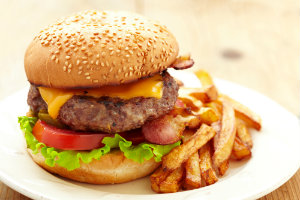Thought for Food - Caloric overkill
The winter 2012-13 issue of the Concordia University Magazine features a four-part series on the role food plays in culture, business, nutrition and defining who we are. In this first segment, Jessica Mudry, assistant professor of general studies in the Faculty of Engineering and Computer Science, says food marketing has never been hotter.

Caloric overkill
Jessica Mudry is interested in the “quantitative language” behind food. Her fascination lies in the “way we talk about food using a nutrition lens” which, she adds, “encourages us to make moral and qualitative judgments about food based on its quantities.”
Calories, carbohydrates and proteins may be quantifiable scientific realities, yet do they create “qualities of food?” Mudry, an assistant professor of general studies in the Faculty of Engineering and Computer Science, cites an advertisement touting the benefits of vitamin E in almonds. The assumption is that there is scientific proof about their “goodness.” “If we are talking about the goodness of almonds, we’re not actually talking about taste or pleasure. We’re talking about something that’s measurable in a lab.” That, says Mudry, is because messages about food quality are often just “discourses of numbers.” When policy is at play, the “goodness” or “badness” of a food has little to do with its taste.
This is where governments fall short. Canada’s Food Guide and Nutrition Facts panels ignore a fundamental aspect of foods: the pleasure we derive from it.
Yet policies focused on what Mudry calls “the scientization of food” look inexorable. Equally relentless are attempts to “find a nutritional magic bullet in all foods,” she says. “Foods are either villainized or championed based on their nutritional profile. That turns us into eating machines and strips away any sort of humanity or experiential element to food.”
That is problematic, Mudry reasons, because if a person’s health can be defined by numbers then so can sickness. “You don’t want somebody walking around saying, ‘I had a good day because I ate 43 grams of fibre.’ ”
Then there is the calorie, a unit of energy that has become an obsession among dieters and, improbably, a cornerstone of nutrition. “We measure the health of a nation on the calorie. How did we get there? When I was a chemist we used calories to measure units of heat.”

So is our scientific framework around nutrition flawed? That is neither here nor there, she says. “It’s
not that it’s an imperfect system; it’s not comprehensive.” Indeed, the framework adds credence to the notion of good food and bad food, supplanting personal tastes to define a populace by
calorific groups.
The pleasure food releases in us is relevant and should be talked about, says Mudry. “Every experience of food is legitimate and good and has the potential to be good.”
As for the ubiquitous calorie, she hopes her new research will explode myths by asking a key question: “When did the calorie become bad? That is like saying an inch is bad.”
Now there’s an idea worth chewing on.

